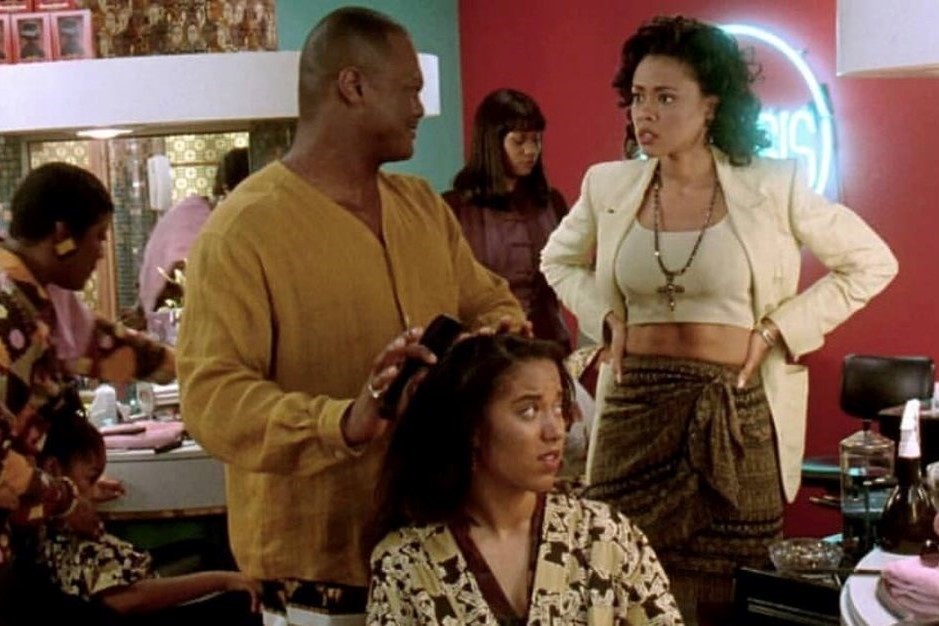
Some argue that it’s fair to charge more for additional labour, others believe detangling fees discriminate against people with natural hair
“Ya’ll see this? Y’all parents love giving me y’all money,” says Michigan-based hairdresser Shawn in a TikTok as she pulls a child’s matted hair apart. Shawn specialises in braiding and styling young children’s hair, and she charges $150 for detangling services alone. “This about to be some work, honey,” she continues in the video. “Comb your kids’ hair out if you don’t want to pay that detangling fee!” Shawn is part of a growing number of hair stylists that work with Black hair who are increasing their fee depending on the state of their clients’ curls. However, the subject of whether clients should pay extra to treat the condition of natural Afro hair is drawing mixed responses from the Black community.
Shirelle McKay-Joseph is a mother from London who has a nine-year-old daughter. She thinks paying an additional fee for detangling is completely fair. “With my youngest daughter, I have to do her hair in stages. One is taking out the braids for an hour, then it’s washing the hair and blow drying it. Then the next day, it needs to be braided,” she explains. “Detangling her hair is so hard because she has so much hair. If I was getting paid to do it, I’d charge extra because you have to have patience.”
McKay-Joseph spends a lot of time moisturising her daughter’s hair, sometimes employing a steam treatment to make the detangling process easier which can take an extra half an hour. She feels that many parents simply don’t have the resources to treat their children’s hair correctly and so they may end up suffering as a result: “If a parent isn’t seeing to the child’s hair and it’s left in plaits and gets matted, they could end up having to cut it off entirely. The price [stylists charge] therefore needs to reflect the condition of the hair.”
The process of detangling hair has often been a contentious subject within the Black community. The early 20th century saw the launch of several products targeted towards Black people with the aim to remove curls and kinks. Garrett Augustus Morgan Sr created the first chemical hair straightener in 1913, and over the decades, large beauty companies have worked to deliver more effective formulas. However, the evolution of the natural hair movement, which has gained momentum since it began in the 1960s, has seen Black people retaliate against chemically straightening their hair. There’s been a modern breakaway from Eurocentric beauty standards that suggest straight hair is superior; nowadays, more Black people feel increasingly confident to ditch the perms and go all natural.
Lynne Egwuekwe is a 31-year-old Black woman who feels that there’s long been too much pressure placed on Black women to adhere to a particular convention. “I think we should stop setting the standard that hair should be super easy to comb through because that’s not what our hair does,” she emphatically explains. “I think that’s part of us trying to mimic the hair practices of people with straighter hair or refer to a time when everyone’s hair was relaxed.” Egwuekwe has 4C type hair and notes that hairdressers have either tried to painfully detangle her curls with a rattail comb or entirely “can’t be bothered” with detangling. “When you have a certain length or density of type 4 hair, sometimes hairdressers look at your hair like it’s a lot of work. There are so many times I’ve been to the hairdressers and seen little girls getting their thicker hair detangled with tears running down their faces,” she says. “It’s strange because most of the time it’ll be Black women doing your hair, but a lot of Black hairdressers don’t know how to treat their own hair. Even spraying it with water to soften the texture will make the experience less painful.”
Discrimination based on hair type has been a pressing topic in recent years. Several states in the US have passed the CROWN Act which disallows discrimination based on hair texture or style at work and school (although in 2022, Republicans in the Senate blocked the bill from passing nationwide). In the UK, schools have been given guidelines around how to tackle hair discrimination by the Equality and Human Rights Commission. Despite these changes at a governmental level, as Egwuekwe suggests, prejudice persists within the Black hair industry itself.
@shadesbyshavonda Detangling fees are they fair or a scam? What are your thoughts?
Follow @shadesbyshavonda for more healthy hair tips
Do you need a resource to help you document your healthy hair journey? Grab your healthy hair planner! (
in bio)
Shavonda Cleveland Hairstylist Silk Press and Healthy Hair Care Healthy Hair Tips
️ Debunking Hair Myths
Appointments Available
Let’s grow together
#Clevelandsilkpress #silkpresscleveland #naturalhaircleveland #clevelandhairstylist #Clevelandnaturalhairstylist #healthyhairtips #healthyhair #silkpresstutorial #creatorsearchinsights ♬ original sound – Shavonda | Healthy Hair Tips
Nicole Crawford is a master stylist at Morii Cph – a hair salon in Copenhagen, Denmark. As a person of colour herself, she believes the industry isn’t up to standard for treating Black hair. “I went to school for four years and during that time I only had one class that mentioned textures other than straight hair,” she says. “Unfortunately, it’s something you have to seek knowledge about yourself if you want to learn. I don’t think a lot of people know where to go and that’s why a lot of hairdressers just don’t know how to master other textures.” As a stylist, however, she’s comfortable with the idea of charging extra money for detangling: “I work based on time and the prices [I charge] reflect that. As long as the client is informed about the extra charges, I think it’s fine.”
Maakare Brown-Dyer is a freelance hairdresser from the UK who often treats clients at their own homes. She explains that the problem doesn’t just lie with professionals. “Most people with thicker hair experiment with products and hairstyles and hope for the best,” she says, explaining that she doesn’t charge extra for detangling because clients “can’t control what type of hair they have”. Oftentimes, she’s noticed that her clients have caused more damage to their hair than necessary. “I just don’t think there’s enough education around how to treat thicker hair at all.”
For Egwuekwe, having thicker hair means detangling is inevitable: “As soon as I comb my hair through, it tangles up in itself pretty much straight away. I think charging for that is a bit ridiculous because that’s what our hair naturally does.” Although McKay-Joseph agrees that detangling is a necessary part of hair upkeep, she sees the extra expense as wholly worthwhile because, “It’s all part of self-care.” Next month, Egwuekwe is looking forward to visiting London’s natural haircare salon the Curl Bar for the first time. The salon asks clients to detangle their hair one to two days before their appointment, otherwise they’ll be charged a fee. Egwuekwe doesn’t seem to have any qualms with this since the salon is open about the time-saving aspect and she believes all hair textures are treated with dignity there. “I just want to be in a place that embraces your kinks and curls for what they are.” In that sense, the price of detangling seems less of an issue and it’s more the way that the procedure is handled that leaves many Black women feeling tied up in knots.
This post was originally published on this site be sure to check out more of their content.








